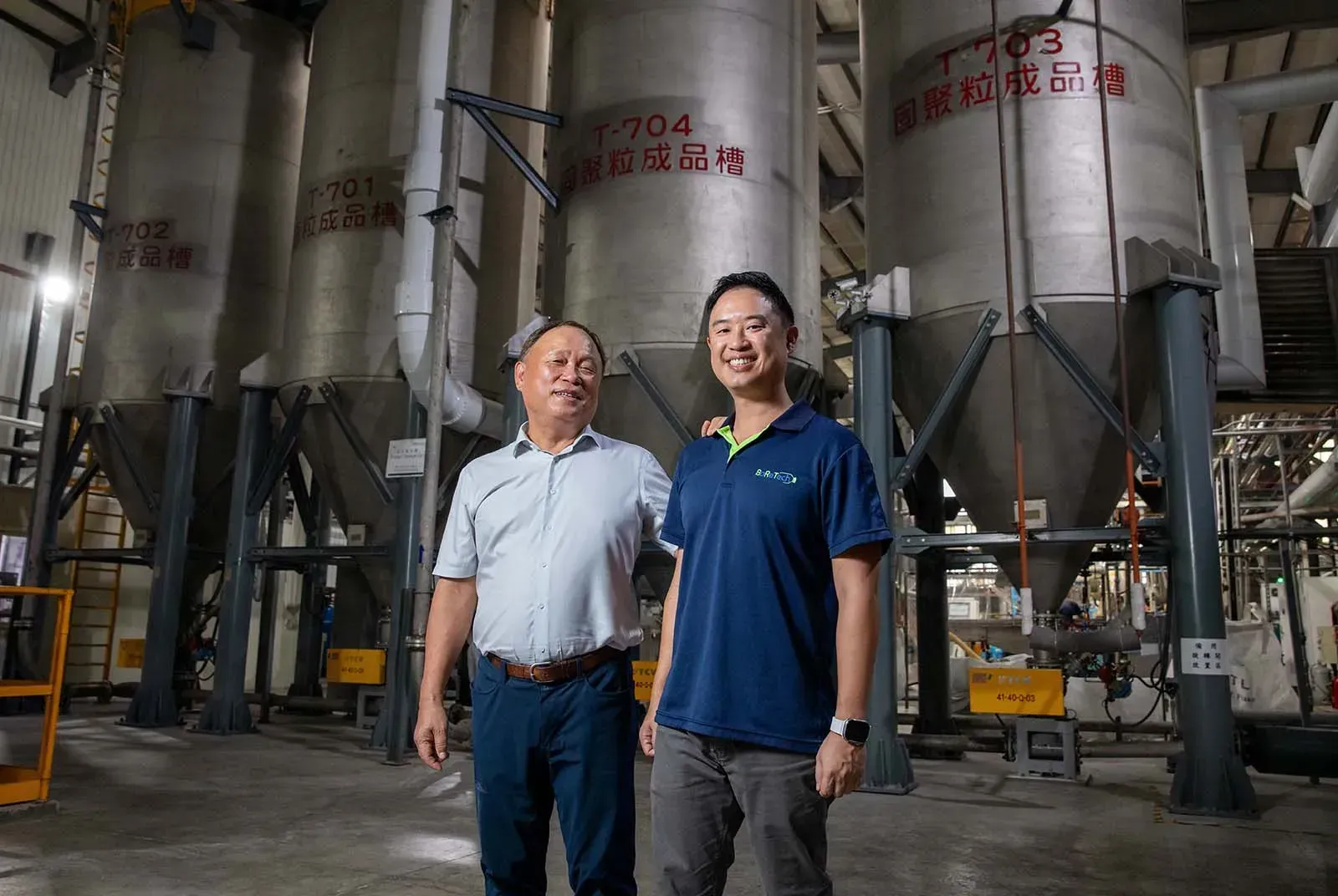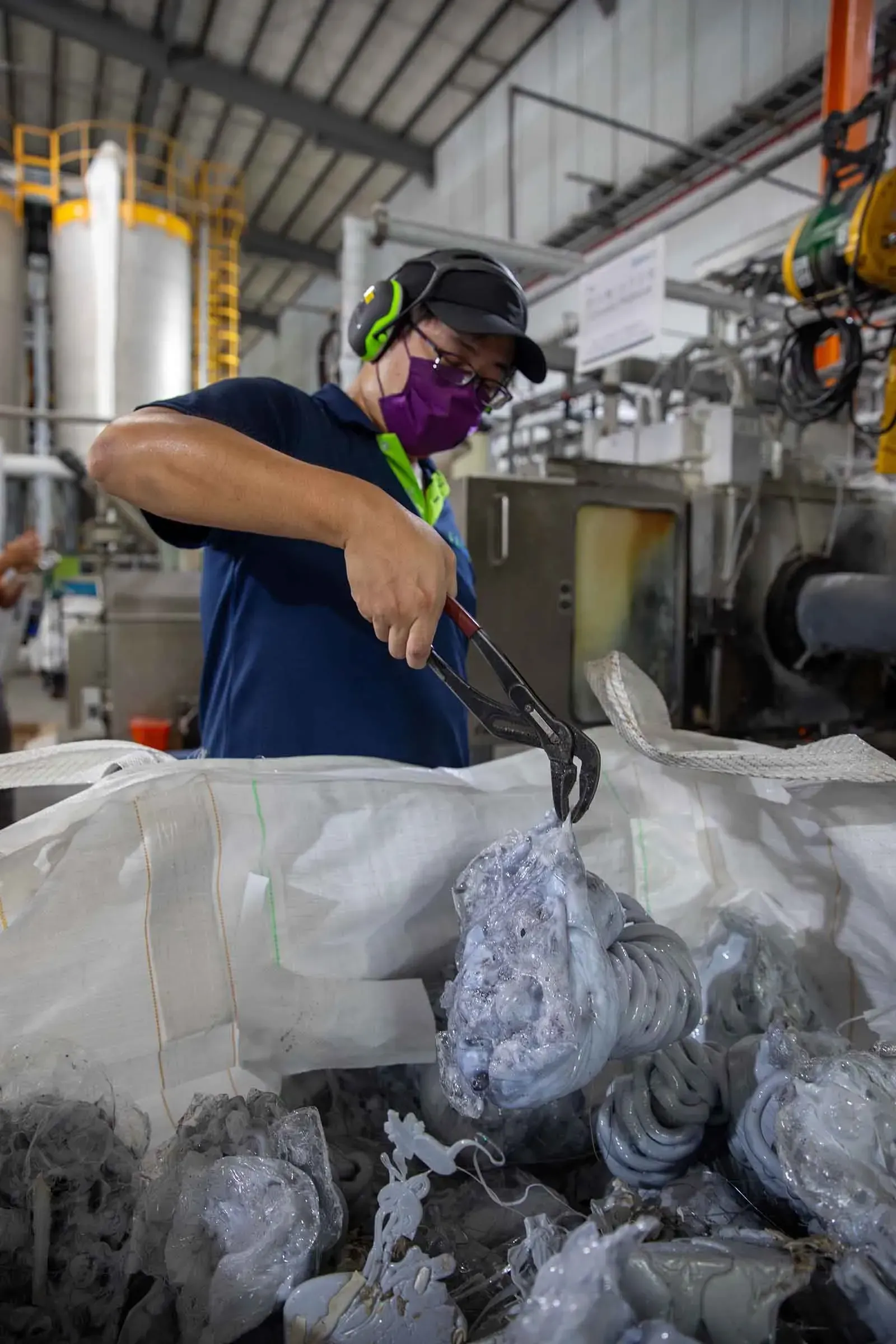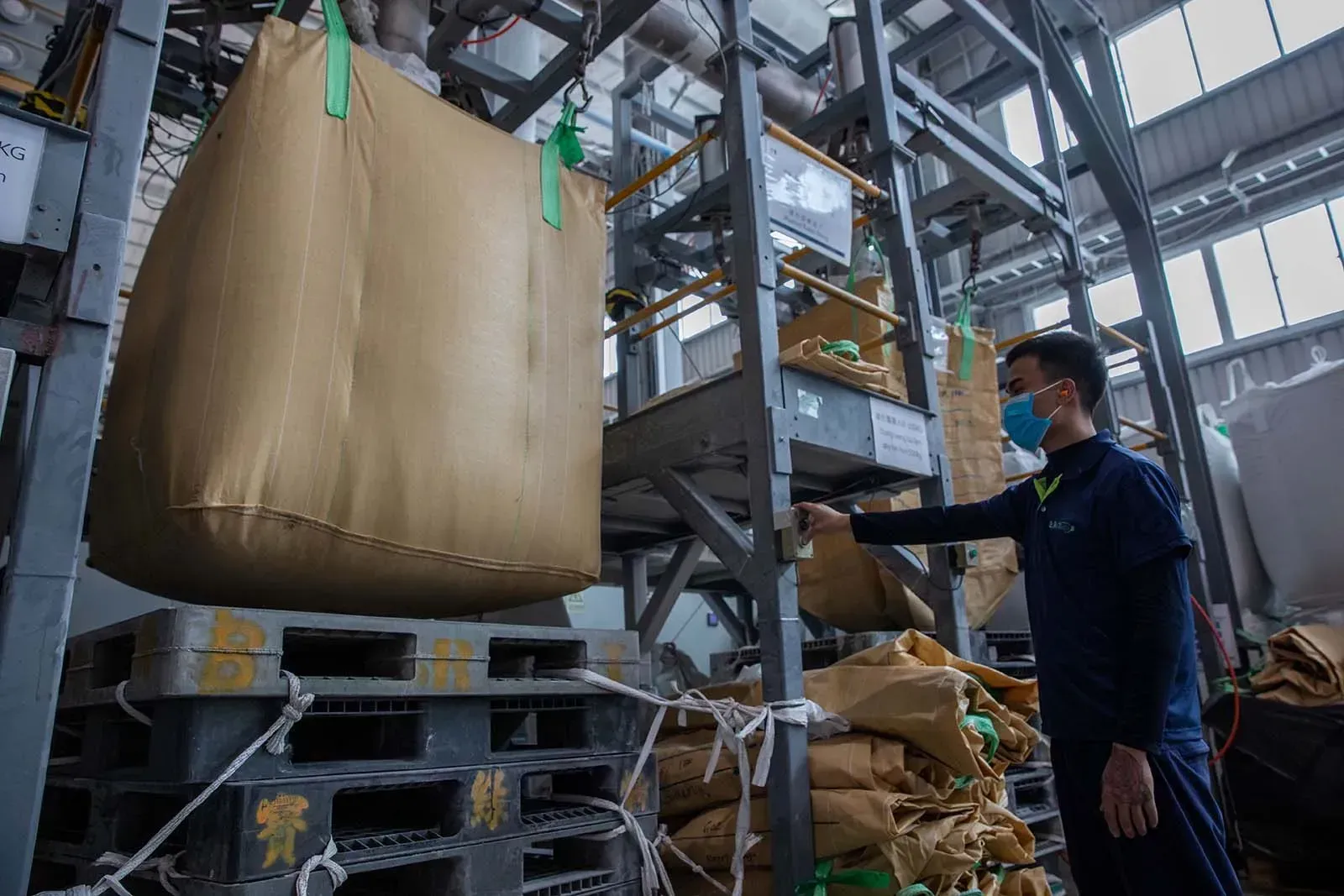CommonWealth Magazine Interview: Polytech went public with its PET bottle recycling business, supplying recycled tableware materials to Costco in the U.S. and Meiji in Japan
Source of Selection:https://www.cw.com.tw/article/5133345

Thirty years ago, Eugene Ou, Chairman of Polytech Recycling Engineering, knew nothing about the PET bottles people casually tossed away after a single use. Yet he decided to take a bold gamble and start a business. Today, that bet has grown into a pre-IPO company with annual revenue of NT$4 billion. Polytech doesn’t just sell recycled materials — it has even turned its suppliers into customers!
Text by Jing-Fang Wu – CommonWealth Magazine Web Only / Published: December 19, 2024
In 1994, Eugene Ou, Chairman of Polytech Recycling Engineering, invested in a recycled polyester fiber plant in Hangzhou, China. At that time, he had never been to China, never seen fiber manufacturing, and only owned a small PET bottle washing facility invested in by his father—a business that was barely profitable.
Back then, Taiwan had just introduced a deposit-refund system for PET bottles. Although theory suggested that washed and crushed PET flakes could be turned into recycled polyester, the local market was immature. The factory survived only with government subsidies, and thousands of tons of unsold raw materials and flakes piled up.
A Hong Kong trader looking to purchase raw materials sparked Ou’s entrepreneurial idea: ‘In Taiwan, I didn’t know who would buy it; but in China, I heard that recycled polyester fiber could sell for NT$15,000–16,000 per ton!’
With funding from friends and family, Ou partnered with a former fertilizer factory undergoing a transformation, eager to process Taiwan’s unsold PET flakes in China—solving his father’s business troubles and making a profit. However, neither party truly knew what recycled polyester fiber was.
This bold gamble by an industry outsider has now grown into Polytech Recycling Engineering, a company preparing to go public.
As of this year, Polytech’s revenue has reached NT$4.6 billion, with production facilities spanning both Taiwan and China. What started as processing PET bottles into recycled polyester fiber has evolved into producing recycled food-grade PET materials in Taiwan. Today, Polytech is the fourth Taiwanese company—alongside Far Eastern New Century, Nan Ya Plastics, and Shin Kong—to achieve a closed-loop ‘bottle-to-bottle’ recycling system, supplying global brands including Costco’s Kirkland Signature and Meiji Dairy in Japan.
In addition, Polytech has vertically integrated and transformed from a recycled material supplier into a full recycling equipment systems integrator. The company has sold over 300 PET bottle recycling, washing, and application production lines worldwide, with installations in more than 40 countries. Together, these systems represent nearly 30% of the world’s PET bottle recycling capacity
CTCI Group has been an investor in Polytech since 2014, with its subsidiary, environmental engineering leader KD Holding, currently holding an 18% stake in the company. ‘Taiwanese entrepreneurs often take one bold step after another, relying on sheer grit to succeed,’ remarked KD Holding Chairman Liao Chun-Che, praising Eugene Ou’s fearless determination.
Venturing into an unfamiliar industry in an unfamiliar market, Ou had neither technical expertise nor business connections. His success stems not only from perseverance but also from a strong market intuition that guided his path

After PET bottles are collected, label-removed, crushed, washed, and dehydrated, they are typically processed into recycled polyester raw materials. However, to produce food-grade polyester, additional pelletizing and solid-state polymerization (SSP) steps are required to remove invisible chemical impurities.”(Photo by Wang Chien-Tung)
Started out with synthetic fiberfill production
Eugene Ou’s father was in the shoe materials business, and Ou noticed early on that global brands were increasingly emphasizing sustainability—meaning the future would see growing demand for recycled materials.
He did the math: while the global per capita consumption of recycled fiber was about 7 kilograms, China’s domestic market averaged only 3 kilograms. This gap represented a natural outlet for Taiwan’s recycled PET bottles. ‘With such a large population base, demand is bound to grow,’ he thought. Though lacking technical expertise, Ou placed ads to recruit talent from the chemical fiber industry.
Once he had assembled a team, the question remained: what kind of recycled fiber should they produce? At the time, an employee told him that in a previous company, they had made short fibers which downstream manufacturers turned into synthetic fiberfill, earning significant profits. This fiberfill could be used for stuffing, as well as in automotive interiors, building materials, and sports equipment.
Ou decided to start by mastering this product. ‘Our fiberfill has exceptional loft, which lets us price it 15% higher than competitors,’ he recalls.
From that point on, Polytech established its technical roadmap and successfully entered the market by focusing on high-value, highly customized short fiber products. The company further developed recycled fibers for flame-retardant nonwoven applications, leading to a significant expansion of its production capacity.
Just a few years after its founding, Polytech had already exhausted the supply of recycled PET flakes from Taiwan’s bottle-washing plants. To keep up with its growing production needs, the company had to source recycled PET flakes from China and eventually from around the world. In the early 2000s, Eugene Ou identified a new business opportunity while procuring raw materials from overseas.
Pivoted into equipment engineering, turning suppliers into customers.
The turning point came from one persistent problem: Eugene Ou could never find consistently high-quality raw materials.
While Europe and the U.S. had relatively complete recycling systems that produced higher-quality PET flakes, most other countries struggled with inconsistent quality. The root cause, Ou realized, was poor recycling equipment—European machinery was prohibitively expensive, so most recyclers pieced together makeshift systems. ‘Why don’t we turn our decade of bottle-washing know-how into world-class processing equipment?’ Ou thought.
With this vision, Polytech began experimenting with small-scale washing equipment, designing and manufacturing through a mix of Taiwanese sourcing and Chinese engineering talent. Early machines were far from perfect, plagued with vibration issues and countless technical challenges. Yet the raw material output consistently met quality standards, and Polytech worked closely with factories to train them in testing methods and quality control. This hands-on approach won over suppliers—who soon became customers.
Starting from washing equipment, Polytech expanded into other recycling processes, building not only its own machinery but also integrating with third-party systems. Crucially, the company embraced full customization, tailoring solutions to the unique characteristics of PET bottles in each market. For example, in Japan, tea bottles have labels covering 90% of the surface; in Taiwan, 95% of bottles are clear PET; whereas in Russia, clear bottles make up only about 40% of the market.
‘European manufacturers often lack the flexibility for customization and front-end planning,’ observed Ou’s son, Po-Hao Ou, who now serves as Chairman of Polytech’s Taiwan subsidiary. He noted that many Asian recyclers that purchased European equipment found their operations inefficient. By contrast, Polytech’s deep familiarity with local market differences, combined with production experience and design flexibility, allows the company to build fully customized recycling plants from the ground up.
As global momentum for plastic reduction intensifies, the race to recycle PET bottles has only accelerated—and Polytech has positioned itself as a leader in this transformation.
While growth in the recycled materials business may be constrained by raw material shortages, demand for PET bottle recycling plants is booming worldwide. Polytech’s equipment division has grown rapidly in recent years, with its gross margin reaching 40% in 2023 and accounting for 30% of total revenue.
The production of rPET (recycled PET) still hasn’t reached a balance point,’ observed Arthur Kuo, General Manager of Jin Yuan Fu, Asia’s leading thermoforming food container manufacturer. ‘Before 2018, recycled PET was typically priced about 3% higher than virgin material. Now, it’s 30% higher—and since last year, even recycling equipment has been in such high demand that waiting a year for delivery is no surprise.

Polytech’s Taiwan plant not only produces food-grade recycled PET, but also serves as a testing ground for new production lines.”(Photo by Wang Chien-Tung)
Building a Plant in Taiwan to Seize the Bottle-to-Bottle Opportunity
In 2018, Polytech established a plant in Taiwan dedicated to the ‘bottle-to-bottle’ recycling process, turning waste PET bottle flakes into food-grade recycled PET. This facility also serves as a verification site for the company’s bottle-to-bottle equipment technology development.
Compared with bottle-to-fiber recycling, bottle-to-bottle recycling requires far stricter food safety standards, and the equipment market is still largely dominated by European manufacturers. To break this dominance, Polytech used its Taiwan plant as a proving ground.
The strategic move into food-grade recycled PET was initiated by Po-Hao Ou.
To achieve a true bottle-to-bottle process, Polytech had to go beyond its origins in bottle-washing and master additional steps such as pelletizing and solid-state polymerization (SSP) to minimize impurities.
In his relentless pursuit of technical expertise, Po-Hao Ou left no stone unturned. He acquired pelletizing equipment from a foreclosed factory in the Czech Republic, disassembled it piece by piece with his engineers, and reverse-engineered the machinery to understand its core technology. He then traveled to the United States and persuaded a company specializing in powdered milk drying technology to transfer to Polytech its long-neglected plastic solid-state polymerization (SSP) equipment know-how.
After six years of R&D, Polytech’s bottle-to-bottle turnkey plant solution has finally borne fruit and is expected to debut in India next year. ‘When customers see our own in-house plant validating the technology, their confidence in us grows significantly,’ said Eugene Ou.
One day, there will inevitably be as many recycling plants as there are production plants—and perhaps even more,’ says Eugene Ou, who once barely understood what recycled materials were, but now has a crystal-clear vision of the industry’s future.
Editor : Wen-Chien Sung




